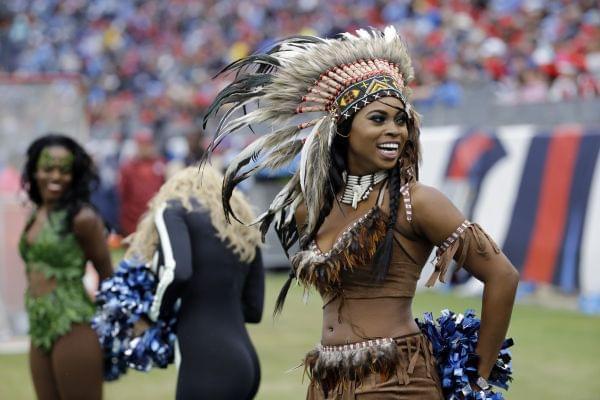Halloween Cultural Costumes Raising Debate On Stereotypes And Racism

"What's amazing is that these costumes are everywhere," said professor Lisa Wade. She cautions that it's okay to dress up like an individual, such as a politician or celebrity, but not as a race as a whole James Kenney/AP
It’s the time of the year when department stores stock their shelves with different outfits for Halloween, including costumes of other cultures. Sexy Geisha, Hey Amigo Mexican man and replicas of Native American headdresses are some real life examples of cultural costumes and they can be found on various Halloween websites.
Cultural costumes have led to a controversial dilemma over whether or not they are racist, sexist and perpetuate cultural appropriation.
Enrique Escarpita is a recent graduate of the University of Illinois and is of Mexican descent. He said cultural costumes are just for fun and shouldn’t be taken seriously.
“Even if someone dresses up as an illegal immigrant and like a cop together – even my Mexican friends did that and it was funny," Escarpita said. "But someone could argue like ‘oh my god that’s the most offensive thing ever.’ Like personally I don’t care. Like I will not. I will laugh and be like ‘wow that’s bogus’ and move on with my life.”
But not everyone is laughing. Lisa Wade is a professor of sociology at Occidental College in Los Angeles. She said that offensiveness has been mislabeled as comedy over time.
“We as, especially younger people, have forgotten or lost track of being funny and being offensive," Wade said. "And so I think there’s a lot of people who have grown up on The Simpsons and going up to Family Guy and South Park and these things and have missed that difference, and so they think that offensiveness is funny in and of itself.”
This week, The Daily Illini published a cartoon referencing a Halloween costume that many felt was offensive. The cartoon, by Rick McKee of the Augusta Chronicle, depicted a small boy on Halloween night, wearing beard-stubble makeup, climbing over a fence and telling his fellow trick-or-treaters, “I’m going as an illegal immigrant.” The student-run newspaper issued an apology, after receiving complaints about the cartoon.
Escarptia said he’s wary of others who make accusations that a certain Halloween costume is offensive. He said people should not speak for a group that they do not identify with or belong to.
“I think a lot of people try to speak for others, try to speak for us as a whole," Escarpita said. "Like ‘oh that’s offensive,’ well actually not it isn’t because I am 100 percent Mexican and I don’t find that offensive so maybe you should speak for yourself instead of trying to speak for everyone else.”
However, Wade said everyone has a voice in speaking out against cultural appropriation, and that remaining silent only condones it.
"I don’t think it’s a good idea to be silent," Wade said. "Because if we don’t speak about race influence or racism and these things, we decide to be silent on these things which is in a way condoning it.”
Walmart and the British online fashion store ASOS have both discontinued sales of Halloween costumes criticized as racist this year.

